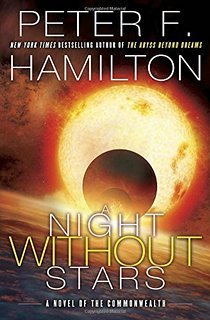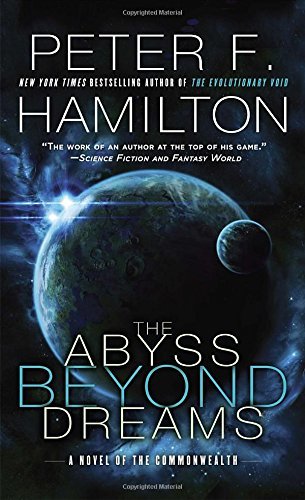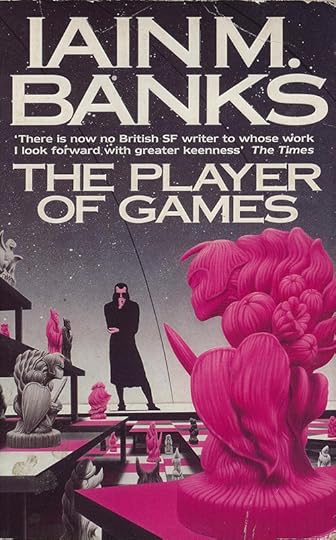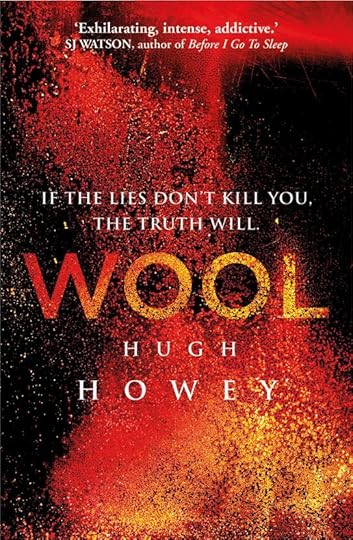Andreas Rosboch's Blog, page 24
October 31, 2016
A Night Without Stars (Chronicle of the Fallers II) – Peter F. Hamilton
 Two hundred and fifty years after the events in The Abyss Beyond Dreams, Bienvenido society has been profoundly changed. The planet has been exiled from the Void to a star system outside any galaxy, perhaps because the inhabitants “misbehaved”. It orbits the lonely star together with a scattering of other planets with a similar fate, some with extant species, others sterile. After Slvasta’s revolution, society follows an oppressive model similar to Stalinism. The state rules and the secret police is its enforcer, feared by all, but mostly by “Eliters”, those who have working macrocellular clusters, stemming from certain genetic traits inherited from the Commonwealth thousands of years previously. The Eliters are downtrodden but defiant. Bienvenido is still under attack by the Faller trees, now slowly being chipped away at by regular space missions to destroy them one by one with nuclear bombs.
Two hundred and fifty years after the events in The Abyss Beyond Dreams, Bienvenido society has been profoundly changed. The planet has been exiled from the Void to a star system outside any galaxy, perhaps because the inhabitants “misbehaved”. It orbits the lonely star together with a scattering of other planets with a similar fate, some with extant species, others sterile. After Slvasta’s revolution, society follows an oppressive model similar to Stalinism. The state rules and the secret police is its enforcer, feared by all, but mostly by “Eliters”, those who have working macrocellular clusters, stemming from certain genetic traits inherited from the Commonwealth thousands of years previously. The Eliters are downtrodden but defiant. Bienvenido is still under attack by the Faller trees, now slowly being chipped away at by regular space missions to destroy them one by one with nuclear bombs.
Several characters from the first book remain, still working towards a solution to the Faller incursions, which are getting worse despite claims to the contrary by the regime. Nigel may be gone but another famous Commonwealth character steps onto the scene in these desperate times.
While the first book had a definite ending, and this one introduces new protagonists with new character arcs, it is also very much a continuation and conclusion to the series. Mr. Hamilton uses his customary skill in weaving all the threads together into a rousing and satisfying finale, as well as an epilogue that will have long time fans smiling beatifically.

October 11, 2016
The Abyss Beyond Dreams (Chronicle of the Fallers I) – Peter F. Hamilton
 Laura Brandt is in stasis as her dynasty is journeying outside the Commonwealth to set up a new society. The Commonwealth is thriving, but the enigmatic and sinister Void casts its shadow as it continues to expand, devouring the galaxy sun by sun. Through happenstance, the Brandt fleet is caught in the Void, trapped in proximity to a planet surrounded by what look like huge orbiting trees, but which house a terrifying alien race.
Laura Brandt is in stasis as her dynasty is journeying outside the Commonwealth to set up a new society. The Commonwealth is thriving, but the enigmatic and sinister Void casts its shadow as it continues to expand, devouring the galaxy sun by sun. Through happenstance, the Brandt fleet is caught in the Void, trapped in proximity to a planet surrounded by what look like huge orbiting trees, but which house a terrifying alien race.
Thousands of years later, on the planet, now known as Bienvenido, a young soldier called Slvasta is patrolling after a Faller incursion, as yet again “eggs” from the orbiting Trees have fallen. Many generations after colonization by the crippled Brandt fleet, society is at a low industrial level. The eggs are biological weapons which attract and consume humans. Slvasta survives an encounter but loses an arm, leading to his reassignment to the capital. Here, he and his girlfriend Bethaneve set in motion events that will transform Bienvenido society, with more than a little nudging from Nigel Sheldon, who entered the void on mission to the planet Querencia (from the Void trilogy) but was waylaid to Bienvenido.
This book is the first of two in the series. The larger story of the Void and the Commonwealth is continued from Commonwealth Saga and the Void Trilogy, but the story on Bienvenido is relatively self-contained. Unsurprisingly for a Hamilton book, the hundreds of pages fly by, populated by vivid characters and settings. While some might find it disappointing that Mr. Hamilton is focusing on stories set in societies that are not representative of the super-high-tech Commonwealth, I find that he could write any story and I would still read it. Bienvenido is a fascinating setting, and its detachment from greater human society makes the story all the more poignant.

October 5, 2016
Monster Hunter Nemesis (Monster Hunter International V) – Larry Correia
 Like Monster Hunter Alpha, the fifth book in the series also diverts to a “minor” character, in this case the enigmatic and fascinating Agent Franks of the Monster Control Bureau. After the events in Monster Hunter Legion, Stricken is determined to take control of the government’s monster control assets, and this involves eliminating a pesky incorruptible and almost indestructible asset. Agent number one, Franks.
Like Monster Hunter Alpha, the fifth book in the series also diverts to a “minor” character, in this case the enigmatic and fascinating Agent Franks of the Monster Control Bureau. After the events in Monster Hunter Legion, Stricken is determined to take control of the government’s monster control assets, and this involves eliminating a pesky incorruptible and almost indestructible asset. Agent number one, Franks.
Mr. Correia spins a good yarn, combining quirky and interesting ideas with an ability to write unusual characters in a believable fashion.

September 22, 2016
Monster Hunter Legion (Monster Hunter International IV) – Larry Correia
 After a diversion with Earl Harbinger in Monster Hunter Alpha, we are back with Z and the gang, who are attending ICMHP, the first International Conference of Monster Hunter Professionals, in Las Vegas. (Yes, really…) Naturally, things go south rather quickly, with more and less nefarious government agencies, a weaponized paranormal entity that was buried decades before, and many humorous shenanigans.
After a diversion with Earl Harbinger in Monster Hunter Alpha, we are back with Z and the gang, who are attending ICMHP, the first International Conference of Monster Hunter Professionals, in Las Vegas. (Yes, really…) Naturally, things go south rather quickly, with more and less nefarious government agencies, a weaponized paranormal entity that was buried decades before, and many humorous shenanigans.
The level of destruction and mayhem in this installment tops all the others, and it is great fun despite the sinister implications of a coming all-out war with a “big bad” coupled with even an more sinister government agency whose real motivations are unknown. Mr. Correia’s action set pieces are a real treat. It’s like watching a blockbuster movie in your head.

September 6, 2016
Monster Hunter Alpha (Monster Hunter International III) – Larry Correia
 In a departure from the first two books, this one is all about Earl Harbinger, centenarian werewolf and leader of Monster Hunter International. “Z” and the others don’t appear at all. Earl is summoned by an old friend to a small town in Michigan in order to deal with a threat rooted in their common past.
In a departure from the first two books, this one is all about Earl Harbinger, centenarian werewolf and leader of Monster Hunter International. “Z” and the others don’t appear at all. Earl is summoned by an old friend to a small town in Michigan in order to deal with a threat rooted in their common past.
This was the best one in the series so far. It has a more serious tone than the first two as it delves deep into Harbinger’s origin story.

August 27, 2016
Monster Hunter Vendetta (Monster Hunter International II) – Larry Correia
 Owen “Z” Pitt and his team of Monster Hunters have just completed a mission in Mexico when Z is attacked by a powerful supernatural. Apparently he wounded the Big Bad in the first book, and there’s a now a price on his head.
Owen “Z” Pitt and his team of Monster Hunters have just completed a mission in Mexico when Z is attacked by a powerful supernatural. Apparently he wounded the Big Bad in the first book, and there’s a now a price on his head.
Not quite as good as the first one, but still a good time. Mr. Correia certainly knows how to write an action scene.

August 14, 2016
Monster Hunter International (Monster Hunter International I) – Larry Correia
 Owen Zastava Pitt is an accountant working a boring job with an idiot boss. Until his boss turns into a werewolf and almost kills him. But Owen Pitt is a huge, strong guy and a gun enthusiast. After defeating the werewolf he is recruited by a secretive organization called Monster Hunter International. They hunt and kill monsters such as wights, zombies and Vampires. The US federal government pays bounties on killed monsters, and even has a Monster Control Bureau to deal with the secret threat.
Owen Zastava Pitt is an accountant working a boring job with an idiot boss. Until his boss turns into a werewolf and almost kills him. But Owen Pitt is a huge, strong guy and a gun enthusiast. After defeating the werewolf he is recruited by a secretive organization called Monster Hunter International. They hunt and kill monsters such as wights, zombies and Vampires. The US federal government pays bounties on killed monsters, and even has a Monster Control Bureau to deal with the secret threat.
The premise is silly but it doesn’t matter. Pitt and his colleagues are a fun bunch to hang out with. The story is full of action and moves swiftly forward. Mr. Correia has a knack for cynical, dry humor that reminds me of John Ringo. Good fun!

August 5, 2016
Grand Central Arena (Grand Central Arena I) – Ryk E. Spoor
 Pilot Ariane Austin joins the crew of the first manned ship to attempt to break the lightspeed barrier. The first “jump” takes them to a large enclosed space containing a model of the solar system.
Pilot Ariane Austin joins the crew of the first manned ship to attempt to break the lightspeed barrier. The first “jump” takes them to a large enclosed space containing a model of the solar system.
The characters are bland and too quickly introduced. They are all great at their jobs except for the one who is blatantly foreshadowed to have a hidden agenda. The technobabble is grating.
I really tried but I couldn’t finish this one.

The Player of Games – Iain M. Banks
 Jernau Gurgeh is the best game player the Culture has ever seen. (For clarity, these games are analogous to the board games of today. He writes scholarly papers on them. He takes parts in tournaments. He lives and breathes games. However, he is somewhat bored. The Culture is a post-scarcity society, with no want, death, suffering or exploitation. Winning at games is a purely intellectual pleasure. However there are civilizations outside the Culture. Gurgeh is contacted by Special Circumstances, a branch of “Contact”, the Culture’s organizations for dealing with newly contacted civilizations. It seems that in the barbaric Empire of Azad, a monumentally complex game is used to control appointments to government offices, even so far as to decide who becomes emperor.
Jernau Gurgeh is the best game player the Culture has ever seen. (For clarity, these games are analogous to the board games of today. He writes scholarly papers on them. He takes parts in tournaments. He lives and breathes games. However, he is somewhat bored. The Culture is a post-scarcity society, with no want, death, suffering or exploitation. Winning at games is a purely intellectual pleasure. However there are civilizations outside the Culture. Gurgeh is contacted by Special Circumstances, a branch of “Contact”, the Culture’s organizations for dealing with newly contacted civilizations. It seems that in the barbaric Empire of Azad, a monumentally complex game is used to control appointments to government offices, even so far as to decide who becomes emperor.
Writing about a post-scarcity utopia is difficult. There is no real struggle. The interesting stories come about when there are encounters with the world outside the utopia’s borders. In fact the novel is slow and ponderous until the action reaches the Empire of Azad. The protagonist suffers from ennui but the reader is not left with a strong impression of him. He comes alive once the stakes are real, going through a transformation from happy but docile citizen of the culture to vibrant player, both literally and figuratively, with the means to affect society in very significant ways. The metaphor may be in-your-face but it is still well written.

Wool Omnibus (Silo I) – Hugh Howey
 Originally published as five linked novelettes, which is why this is also known as “Wool I-V”, this novel is set in a large, vertical underground habitat known as the Silo. The inhabitants are unaware of the outside world apart from the desolate and poisoned terrain they can see on cameras set at the top level of the Silo, which just breaches ground level. The worst crime in the Silo is talking about going outside. The punishment for this is being sent out for “cleaning”, which involves being put into a protective suit and cleaning grime off the lenses of the cameras. After a few minutes the suit fails and the criminal dies in the toxi atmosphere. However, even the cowed inhabitants of the Silo have questions. What happened outside? Who built the Silo? Why is the IT department so mysterious and secretive? Juliette, a woman from the “down deep” engineering levels follows her instincts and stumbles on secrets buried for generations.
Originally published as five linked novelettes, which is why this is also known as “Wool I-V”, this novel is set in a large, vertical underground habitat known as the Silo. The inhabitants are unaware of the outside world apart from the desolate and poisoned terrain they can see on cameras set at the top level of the Silo, which just breaches ground level. The worst crime in the Silo is talking about going outside. The punishment for this is being sent out for “cleaning”, which involves being put into a protective suit and cleaning grime off the lenses of the cameras. After a few minutes the suit fails and the criminal dies in the toxi atmosphere. However, even the cowed inhabitants of the Silo have questions. What happened outside? Who built the Silo? Why is the IT department so mysterious and secretive? Juliette, a woman from the “down deep” engineering levels follows her instincts and stumbles on secrets buried for generations.
Wool starts unassumingly. Silo society is working relatively harmoniously, the vertical design cleverly engineered to ensure social stratification and a lack of unity across departments. However Mr. Howey is not afraid to throw large wrenches in the works for the protagonist as she starts on her odyssey to find the truth. While the second half sometimes drags on a bit, this is a fine piece of post-apocalyptic fiction, and unlike that in some other such “set piece” oeuvres, the setting itself feels well-thought out and plausible.




